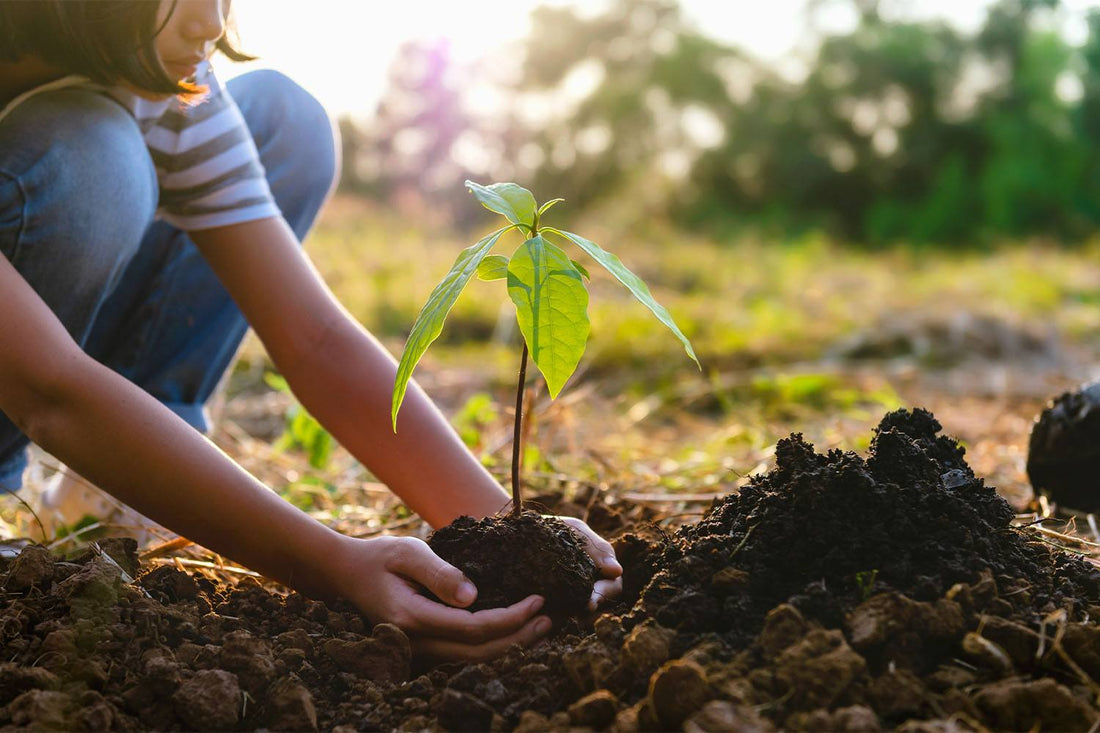
Mother Earth Day - how we can help
Share
Did you know?
- The planet is losing 4.7 million hectares of forests every year – an area larger than Denmark.
- A healthy ecosystem helps to protect us from these diseases - biological diversity makes it difficult for pathogens to spread rapidly.
- It is estimated that around one million animal and plant species are now threatened with extinction.source
As we approach Mother Earth Day, let's take a look at what we can do to protect our environment and ensure we have a sustainable economy that works for both the people and the planet.
We need to work with nature to ensure that in turn, the planet looks after us. It’s understandable to look at the big picture and feel intimidated - what can I possibly do about all of that?!
But if each of us focus on small changes, we can absolutely have a big impact. And a good way to approach the issue is to think of the three R's: Reduce. Reuse. Recycle.
Reduce
There are many things you can do to reduce the number of resources you use, saving energy, emissions and often saving you money too.
- Switch off the lights and electronic items when not in use. A single computer and monitor left on for 24 hours will cost more than £50 a year
- Turn down the heating and wear a jumper.
- Turn off the water when not needed, from brushing teeth, washing dishes or taking a shower ensure you only use what you need.
- Wash clothes at a lower temperature.
- Only print what is necessary, switch to online statements and remove yourself from mailing lists. Decreasing the demand for paper will help to decrease the rate of deforestation.
- Buy local produce. This reduces fuel used to transport goods and also supports local businesses.
- Only boil enough water for your needs for hot drinks.
- Walk or cycle short distances rather than take the car.
- Eat less meat. Not everyone wants a meat-free diet but cutting back, maybe to meatless Mondays can help to reduce your carbon footprint.
Reuse
Cut down on singles use items and give things a new lease of life. Here are a few examples:
- Use a backpack or bag from home or buy reusable bags that you can keep in your car and use again and again.
- Save foods that have gone to seed or keep the seeds from certain foods and grow them in your garden. It’s a great way to teach children about nature and to save money and resources.
- Compost leftovers. Global research shows that we waste about a third of our food and food waste is a big contributor to climate change. Instead of putting peelings in the bin, use the orange peel, potato skins and others to make compost that can be put back into the soil to make it richer.
- Don’t waste food. In Britain, if we stopped wasting food, we could avoid 18 million tonnes of carbon dioxide equivalents being emitted each year. Buy only what you need and get creative with leftovers
- Join with friends and pass on children's items, many clothes are hardly worn before children grow out of them, pass them down and swap.
- Save wrapping paper that can be used time and time again or cards that can be made into gift tags.
Recycle
Just as many things can be reused, turning them into something new is just as exciting. For example:
- Your old, unused or broken computers, tablets, phones and other electronics can often be recycled for free by stores.
- Upcycle old clothes and furniture into something new, giving them a new lease on life.
- Save envelopes and other paper as scrap paper, it saves buying notebooks and saves money.
- Add water butts to your drainpipes and use the water to give your vegetables a drink when it's dry.
- Purchase products made from recycled products.
- Find multiple uses for one item. For example, tin cans once finished with can be used as plant pots or to scare birds away, lolly sticks can be used as plant labels and take away boxes can be used for storage.
- Planting a tree helps air quality and will provide homes for insects, birds and small animals. If you don’t have a garden, growing flowers in a window pot will attract bees and other pollinators which play a vital role in our ecosystem.
Whilst steps are being taken to reduce waste, research shows that there is still a long way to go. For example, less than 14% of plastics produced are actually recycled, 5.2 tonnes of waste were generated per EU inhabitant in 2018 and 38.5 % of waste was landfilled.
At Britt’s Superfoods, we are passionate about protecting our planet as she provides us with the raw materials, we need for our superfood juices.
That’s why we have always used sustainable organic farming methods and are constantly looking at ways to reduce our carbon footprint.
We have recently introduced packaging that's made from recycled plastic bottles and will continue to look to environmentally friendly solutions to ensure that we can protect Mother earth and continue to bring you the best superfood juices that Nature has to offer.

